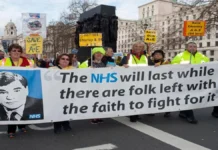I want to make three points. First, universal credit is not being introduced in isolation; it follows so-called welfare reforms that were made under the Labour Government, the coalition Government and this Government. The cumulative impact for many of my constituents has been destitution. We have made decisions in this House to pay for pensioner households rather than ordinary families.
I have being running constituency surgeries for 38 years. At the most recent surgery, just last Friday, for the first time ever a gentleman rose after we had spoken and I had to try to persuade him not to commit suicide. Such was his desperation at the future he saw for himself. I realised that the hand that shook my hand was wet, because he had been crying. The hand that shook my hand was the hand that had wiped away those tears.
On Friday, Feeding Birkenhead—a brilliant organisation, but one that ought to be unnecessary—reported a family coming in, a husband and wife and their young child. The child was crying with hunger. The family was fed. The father said that it had been a lucky week for him, because neighbours had taken pity and invited them to a funeral, so that they could finish off the food after the other guests had been fed. When their little boy was shown the shelf where the toys and lunch packs were kept, he chose the lunch pack. That is the background of growing destitution that I see in my constituency, and against which we have to judge universal credit and the debate we are having today.
Many DWP staff do not share the Secretary of State’s confidence in this benefit. Feeding Birkenhead is putting considerable food through schools, which get it home where it is needed. On Saturday we will be filling thousands upon thousands of Christmas hampers, and among the volunteers will be 146 DWP staff. They know where this benefit is going and they are unhappy. [Interruption.] The Secretary of State is mumbling. Their inability to show their normal compassion by having discretion is an issue of such importance that we will return to it soon.
Against that background, we come to the request for papers. The Secretary of State and I have noticed that this motion is different from the motion on the Committee on Exiting the European Union. That Committee was to receive the papers and lay them before the House. This motion does not ask for that. I love being a member of the Work and Pensions Committee, but I can assure the House that we are not a group of Trappist monks and monkesses; people will naturally want to talk. Therefore, before any documents come to us, I will be asking for the Speaker’s interpretation of this motion, and what sense of secrecy or honour will bind the Committee when we receive the documents. Even if we only read them, that will surely affect how we pose questions. If they are all so good, surely we would have received them long ago.
That is why I will seek the Speaker’s advice. It may partly be why Members on the Treasury Bench have accepted the motion: because it now shifts all the pressure from them to the Select Committee. As I said, we are thankfully not made up of Trappist monks and monkesses. We are all very active members of the Committee.
I will make my last and perhaps most important point. The Government and Government Back Benchers—a rather rude one to my hon. Friend the Member for Great Grimsby (Melanie Onn) earlier—keep making assertions about the wonder of the benefit, for which there are no figures in the public domain. We do not know how the benefit affects work records, apart from those of the simplest claimants. We do not know from the Government the effect on rent arrears or on the use of food banks. We do not fully know the numbers of people who are waiting in our constituencies for more than six weeks—soon, thank God, five weeks, on which I congratulate the Secretary of State.
In the great spirit of openness, with which the Secretary of State has landed the Select Committee, I hope that we will shortly put before Parliament the data on the working of the new benefit, which will tell us whether the grand assertions that the Secretary of State and Ministers continue to make are true. I hope that they are true, but none of us has the data to back them up.
Before we do not vote on the motion tonight, I want to recall that the benefit is being rolled out for families of working age who have suffered multiple and cumulative benefit cuts. I described some of the effects. How does an MP give someone hope, when I do not have hope for them, that things will radically improve, and persuade them not to top themselves? What do we do to a family, who last year gave toys for our Christmas hampers, but have been so reduced in circumstances that this year, their little boy cries with hunger? That is the message that I want to go out from the debate.
We will receive the documents and advice on what we are to do with them, but I hope that the Secretary of State does not believe that releasing them—some of historical value—will prevent the Committee’s insistence on a proper publication of data, which allows us to hold the Government to account for the hunger in our constituencies.
This is a "Pay as You Feel" website Please help keep us Ad Free.
You can have access to all of our online work for free. However if you want to support what we do, you could make a small donation to help us keep writing. The choice is entirely yours.
























